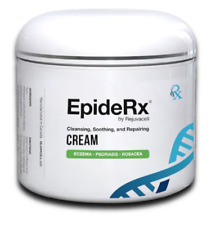The Ultimate Guide to Itch-Relieving Creams

Strong 8k brings an ultra-HD IPTV experience to your living room and your pocket.
Introduction
Itchiness can be more than just an annoying inconvenience; it can significantly impact one's quality of life. From a simple mosquito bite to chronic skin conditions, the discomfort can be profound. One common solution to alleviate this irritation is the use of relieving creams. These topical products are designed to soothe the skin and reduce the urge to scratch, which can prevent further irritation and potential skin damage. In this comprehensive guide, we’ll explore everything you need to know about itch-relieving creams, including their types, key ingredients, and how to choose and use them effectively.
Understanding Itchiness
Itchiness, or pruritus, is a common sensation that can be triggered by various factors.
Causes of Itchiness
Allergic Reactions: Allergies can lead to itchy skin due to the body's immune response. Common allergens include certain foods, medications, and environmental triggers like pollen.
Skin Conditions: Conditions such as eczema, psoriasis, and dermatitis are well-known culprits of persistent itching.
Insect Bites: Bites from mosquitoes, fleas, or other insects can cause localized itching as the body reacts to the insect's saliva.
Dry Skin: When the skin loses moisture, it can become dry and itchy. This is often exacerbated by environmental factors such as cold weather or frequent washing.
Symptoms of Itchiness
Symptoms can range from mild irritation to intense itching that disrupts daily activities. Other related symptoms may include redness, swelling, or a rash.
Types of Itch-Relieving Creams
Choosing the right itch-relieving cream depends on the cause of the itching and the severity of the symptoms.
Over-the-Counter Options
Hydrocortisone Cream: A common choice for reducing inflammation and itching caused by allergies or skin conditions.
Calamine Lotion: Often used for its soothing properties, calamine lotion is effective for relieving itching from insect bites or mild skin irritations.
Prescription Options
Topical Steroids: For more severe itching, a doctor may prescribe stronger steroids that provide more intense anti-inflammatory effects.
Immunomodulators: These are used for chronic skin conditions like eczema, helping to regulate the immune system's response to irritants.
Key Ingredients in Itch-Relieving Creams
Understanding the key ingredients can help you choose a cream that best addresses your specific needs.
Antihistamines
These ingredients block histamines, chemicals in the body that cause allergic reactions. They are effective in reducing itching associated with allergies.
Corticosteroids
Powerful anti-inflammatory agents that reduce redness, swelling, and itching. They are used for conditions like eczema and psoriasis.
Moisturizers
These help to hydrate the skin, which can reduce dryness and subsequent itching. Ingredients such as glycerin and lanolin are commonly used.
Antifungals
For itching caused by fungal infections, antifungal ingredients in creams can help eliminate the cause and soothe the skin.
Antibacterials
If itching is due to bacterial infections, antibacterial agents can prevent the spread of infection and relieve associated symptoms.
How Itch-Relieving Creams Work
relieving creams typically work by targeting the underlying cause of the itching or by providing a soothing effect that reduces the urge to scratch.
Mechanism of Action
These creams often work by interfering with the chemical signals in the skin that trigger itching. As an additional precaution against skin irritation, they may also create a barrier.
Interaction with Skin Cells
The active ingredients in itch-relieving creams interact with skin cells to reduce inflammation, inhibit the immune response, or block histamine receptors.
Reduction of Inflammation
By reducing inflammation, these creams can decrease the redness and swelling associated with itching, making the skin feel more comfortable.
Choosing the Right Itch-Relieving Cream
Selecting the right cream depends on the cause of the itching and the specific needs of your skin.
For Allergic Reactions
Look for creams containing antihistamines or corticosteroids to address the allergic response and reduce itching.
For Eczema and Psoriasis
Topical steroids or immunomodulators are often recommended to manage chronic skin conditions effectively.
For Insect Bites
Calamine lotion or creams with anti-itch agents like menthol or camphor can provide quick relief.
For Dry Skin
Moisturizing creams that contain hydrating agents such as glycerin or petrolatum can help alleviate dryness and itching.
Application Tips
Applying itch creams correctly is crucial to optimizing their efficacy.
How to Apply Itch-Relieving Cream
Gently massage in a small amount of cream after applying it to the afflicted area. Avoid using more than the recommended amount as this can lead to side effects.
Frequency of Use
Observe the directions on the product label or the advice of your physician concerning the frequency of cream application.
Precautions and Side Effects
Be mindful of possible adverse effects, such as irritation, allergic reactions, or thinning of the skin. If you experience any significant side effects, stop using the product and consult a physician.
Natural Alternatives to Itch-Relieving Creams
For those who prefer natural remedies, several options can offer relief from itching.
Aloe Vera
Known for its soothing properties, aloe vera gel can provide instant relief from itching and inflammation.
Coconut Oil
Coconut oil is a natural moisturizer that can help alleviate dryness and itching due to its fatty acids.
Oatmeal Baths
Adding colloidal oatmeal to bathwater can soothe itchy skin and provide relief from irritation.
When to See a Doctor
If over-the-counter treatments and natural remedies do not alleviate your symptoms, or if you experience severe itching, it may be time to consult a healthcare professional.
Persistent Itchiness
If itching persists despite treatment, it could be a sign of a more serious underlying condition that requires medical evaluation.
Severe Reactions
Seek medical attention if you experience severe reactions, such as swelling or difficulty breathing, as these could indicate an allergic reaction or other serious issues.
Underlying Conditions
Conditions like liver disease or kidney issues can also cause itching. A doctor can help diagnose and treat any underlying health problems.
Case Studies and Testimonials
Hearing about real-life experiences can provide insight into the effectiveness of various itch-relieving creams.
Personal Stories
Many people have found relief from severe itching through different creams, and their stories can help guide others in making informed choices.
Effectiveness of Different Products
Comparing the effectiveness of various products based on user experiences can highlight which creams work best for specific types of itching.
Which cream works best for extremely itchy skin?
For severe itching, prescription-strength corticosteroids or antihistamine creams may be the best options. These are typically more effective than over-the-counter remedies. It is crucial to speak with a healthcare professional to obtain a prescription for a cream that is customized for your unique needs and condition.
Can itch-relieving creams be used on sensitive skin?
Yes, some relieving creams are formulated specifically for sensitive skin. Seek for items that are designated as hypoallergenic or made for delicate skin. It's crucial to do a patch test before using a new product extensively to ensure it doesn’t cause irritation.
Does using these creams have any negative effects?
While itch-relieving creams can be very effective, they may come with side effects such as skin thinning, irritation, or allergic reactions, especially with prolonged use. It's important to use these products as directed and consult a healthcare provider if you experience any adverse effects.
How long should I use an itch-relieving cream?
The duration for using an itch-relieving cream depends on the type of cream and the condition being treated. Generally, over-the-counter creams should be used for a short period (usually no longer than 7 days) unless otherwise directed by a healthcare provider. Prescription creams may have different guidelines based on their potency and intended use.
What are the best natural alternatives?
Natural alternatives to itch-relieving creams include aloe vera gel, which soothes and moisturizes the skin, coconut oil, known for its hydrating properties, and oatmeal baths, which can help reduce inflammation and irritation. These options can be particularly useful for those who prefer a more natural approach to skincare.
Conclusion
Creams can be an effective solution for managing and alleviating itchiness caused by a variety of factors. Understanding the different types of creams, their ingredients, and Itch relieving cream application techniques can help you make an informed choice and find relief from itching. Whether opting for over-the-counter options, prescription products, or natural remedies, the right approach can significantly improve your comfort and well-being.
Note: IndiBlogHub features both user-submitted and editorial content. We do not verify third-party contributions. Read our Disclaimer and Privacy Policyfor details.







